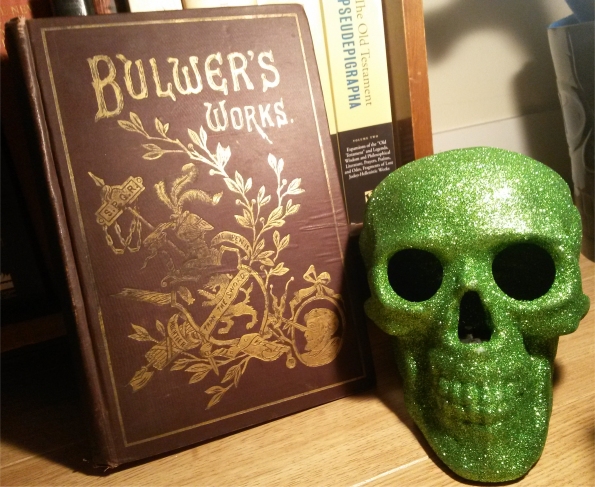
The Haunted and the Haunters; or, The House and the Brain – Lord Lytton
Originally published – 1859
A few years ago, I read about the books of Edward Bulwer Lytton in Colin Wilson’s The Occult. Discovering that this Lytton lad was supposed to be friends with Eliphas Levi and that his books were about wizards, ghosts, and secret societies, I quickly put him on my to-read list. A few months after doing so, I saw his name in Nicholas Goodrick Clarke’s The Occult Roots of Nazism. Combining what I already knew about Lytton with the fact that one of his works had apparently inspired a bizarre conspiracy theory about subterranean, black magic Nazis, I knew that I had to make acquiring his books a priority.
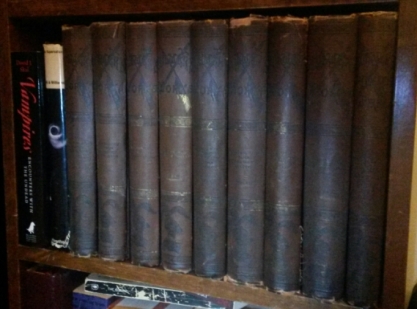
The four texts that Wilson specifically named were Zanoni, A Strange Story, The Coming Race, and The Haunted and the Haunters. I found audiobook versions of the latter two on librivox, downloaded them and stuck them on my phone. The mp3 of The Haunted and The Haunters was only an hour and 10 minutes long, and I listened to it at work the other day.
It was a little disappointing to be honest. A lad hears about a haunted house and decides to spend the night there. He sees some ghosts, and a few days later he discovers a secret room containing a peculiar device that essentially functions as a ghost machine. He breaks the ghost machine, and then everyone lives happily ever after.
This is a ghost story, but it’s not remotely spooky. During the most climactic scenes, the narrator makes a point of telling the reader that he is not afraid, and it’s very hard to feel scared for a person who seems to understand the situation better than you. The chap comes across as a know-it-all wanker to be honest; I’d take a terrified Jamesian protagonist over this gobshite any day.
Lytton’s use of fiction to present his ideas about the supernatural may have been novel at the time this was published, but I found it rather trite. He goes over the old “nothing is really supernatural because supernatural means impossible and nothing is impossible” argument. Just because science can’t yet explain ghosts, ESP, clairvoyance and all that good stuff, there’s no reason to believe that it won’t some day be able to. This is a fair point to make, but it doesn’t have much bearing on whether or not these things actually exist.
The story comes to a very abrupt end. After enduring the night in the house, the lads find a chest of drawers in a secret room. In this chest is a portrait of another lad who the narrator seems to have seen before and a weird, home-made, magic compass that has been cursed. Once this strange device is destroyed, everything is grand. That’s it. End of story.
Fairly shit, all things considered.
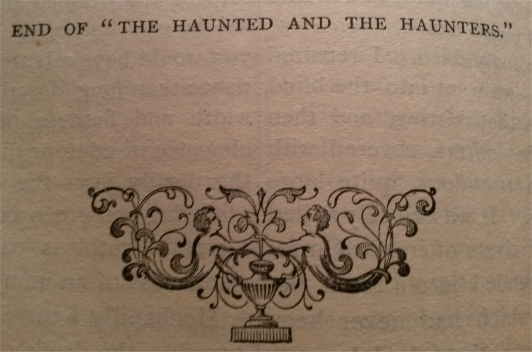 Is that really the end though?
Is that really the end though?
This story was originally published as “The Haunted and the Haunters; or, The House and the Brain” in the July-December 1859 edition of Blackwood’s Magazine. I find it quite strange that an original publication would feature two titles. Subsequent appearances of the tale have often been published under one title or the other. I have read that the “House and Brain” title usually denotes an abridged version of the story, but I have read the exact same thing about the “Haunter and Haunted” title. Perhaps the different titles were once used to denote the different versions of the story, but at this stage, neither title can be trusted to signify the abridgment.
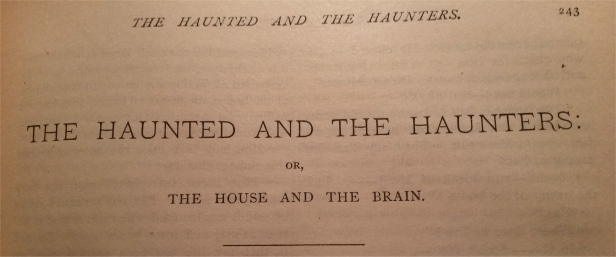 My copy of the text has both titles, but it’s the abridged version.
My copy of the text has both titles, but it’s the abridged version.
If you have any sense and want to make sure that you’re reading the full version, the last paragraph of the original version of the story starts with the phrase;
“So ends this strange story, which I ask no one to believe.”
The first line of the final paragraph in the SHITTY-BUM abridged version reads;
“We found no more. Mr. J—— burnt the tablet and its anathema.“
If there is one thing that I simply can not abide, it’s an abridged book. If this is the ending of the tale you are reading, look elsewhere for satisfaction!
The abridgment absolutely guts the story. The haunting in the original features a creepier ghost, a slightly more gruesome description of the death of the narrator’s dog, several other minor edits, and most importantly: a tense confrontation between the narrator and the wizard responsible for bewitching the house. The complete version is by no means a brilliant piece of literature, but it is at least somewhat coherent, and it’s far more enjoyable than the shortened piece of drek. Imagine reading a version of the Shining in which all references to Jack Torrence’s family have been cut out and you’ll get a sense of the shitness of the abridged version of this tale.
Luckily, the unabridged version is widely available on the web (It’s on page 244 of the edition of Blackwood’s Magazine that I’ve already linked to.). An article from the July 1938 edition of the Theosophical Forum suggests that Bulwer cut parts out of this tale to use in his novel, A Strange Story. That novel was published in 1862, three years after The Haunted and the Haunters. I haven’t read A Strange Story yet, and it may be a while before I get around to it, but I’ll read over Haunted/Haunters again when I do to see how the ideas were transferred between the two.
As I have already mentioned, I first heard about Lytton in Colin Wilson’s The Occult. I decided to read back over the relevant passages in that book to see if there was anything pertaining to this particular story. Wilson quotes the entire description of the curious portrait that is found near the cursed saucer to give an example of what he thinks a black magician should look like. He then says, “And when he later added a new ending to the story, Lytton extended this sketch into a full-length portrait of a man who seems to be a combination of the Wandering Jew and the Count de Saint-Germain.” Colin Wilson, author extraordinaire and expert on the occult, seems to have believed that the original version of this story was the short version. Wilson also lists Lytton’s first name as Henry in the index to the book when his name was actually Edward (His elder brother was named Henry.) Colin Wilson, it seems, was not very thorough in his research.
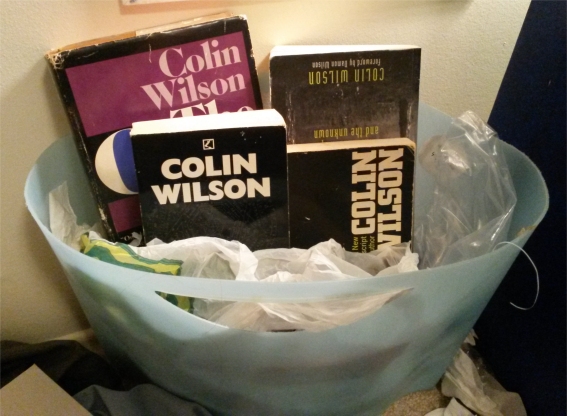 Good riddance to this pile of unlettered garbage.
Good riddance to this pile of unlettered garbage.

Wasn’t Bulwer-Lytton the guy who first used the phrase, “It was a dark and stormy night”? Also, Led Zeppelin’s last UK gigs were played near B-L’s home of the Knebworth estate, where Page checked out some of his artifacts. All part of the universal lattice of coincidence…
LikeLiked by 1 person
Yes, I remember reading The Occult about thirty years ago. There was so much nonsense in it it was kind of entertaining because of its very crapness. If my memory serves me correctly, there was a line in the blurb on the back about how Colin Wilson was a sceptic about reincarnation when he started writing it. Maybe he started writing it in a former life when he was Bertrand Russell or somebody …! 🙂
LikeLiked by 1 person
I’m sorry but to call Colin’s work “unlettered garbage” just because he made an error is absurd. I was lucky enough to meet him on several occasions and he graciously wrote a foreword to a book of mine and he’d be the first to admit he wrote too much to keep the wolf from the door, but he has always been sneered at by the literary establishment here while being respected in other countries.
I only just discovered your blog and it looks interesting stuff, but when I think of CW’s marvellous novels like Ritual in the Dark, his criminology and worthwhile books on other subjects and his unfailing generosity of spirit to other writers I’m rather saddened by this sniping. I have occasionally found errors in books and usually find politely informing the writer or publisher gets a reasonable response (even a credit in future editions).
LikeLiked by 1 person
Absurd? Sure, but I thought it was fairly clear that I was being facetious. I actually quite like Colin Wilson.
LikeLike
Okay! I have to say the fact you were being ironic went over my aged head, and apparently that of previous commenter Debunkerofcassidy too it seems, but it’s reassuring to hear it!
LikeLiked by 1 person
I guess I write this blog thinking that the people who will read it will have read all of the other posts I have made. I don’t want to apologize for making fun of Wilson because making fun of occult authors is what this blog is all about. That being said, I find it a little irksome that the first time anybody has called me out over my nastiness is doing so in relation to an author that has actually been fairly important to me. I really enjoyed Wilson’s History of the Occult, and that book sent me out in search of many other books that have since become favourites. I don’t think that Wilson is beyond criticism, but by no means do I dislike his work, and I assure you that I took his books out the bin right after that picture was taken! I’m very grateful for your comments, and I’ll be keeping an eye out for your book on Crowley. I’m actually working on a few Crowley related posts at the moment, and I’d be hugely interested in your take them when they are written!
LikeLike
The only person beyond criticism is me, of course! I love Peter Haining’s anthologies, but was annoyed at being initially duped by his book claiming Sweeney Todd was real and that he knew the date of his execution etc. I’d love to know if he believed it, lied, made an error or was hoaxing for a laugh. Certaintly he was casual with facts. For example, stating unequivocally that Jack London killed himself when this is an allegation not proved that is dismissed by most scholars I understand.
My Crowley book is okay I guess but I can see lots that could’ve been better, but though I made very little out of it I’m flattered it’s stayed in print over 25 years and that people still tell me it started them off in being into AC. Btw, the USA edition is cut slightly due to complaints over nothing by Kenneth Anger. I’m hoping to do a checklist/bibliography/whatever of fictional characters based on AC and appearances of him in fiction by others.
I was delighted to see your pic of the Cayme edition of Discovery of Witches by Summers – my copy sold during lean times. Myself and Edwin Pouncey (aka Savage Pencil) put up a stone on Summers’s then unmarked grave back in the 80s, bearing his catchphrase “tell me strange things”.
LikeLiked by 1 person
That’s a really cool idea about the fictional characters based on Crowley. The only dedicated post on Crowley that I’ve done was on his appearances in the works of Maugham and Wheatley.
https://dukederichleau.wordpress.com/2015/12/31/did-aleister-crowley-create-strange-lifeforms/
Wow, I have heard of that stone on Summers’ grave before! I’ve actually been planning to visit it if I’m ever in Europe again.
LikeLike
I live in Barnes now, close to Richmond where Montie is buried and go now and then to tidy up the grave or leave flowers on his birthday. By all means email if you ever plan to go and I can take you there as it can be difficult to locate in the large cemetery.
LikeLiked by 1 person
Thank you my friend. What is your email address? Mine is dukederichleau666@gmail.com
LikeLike